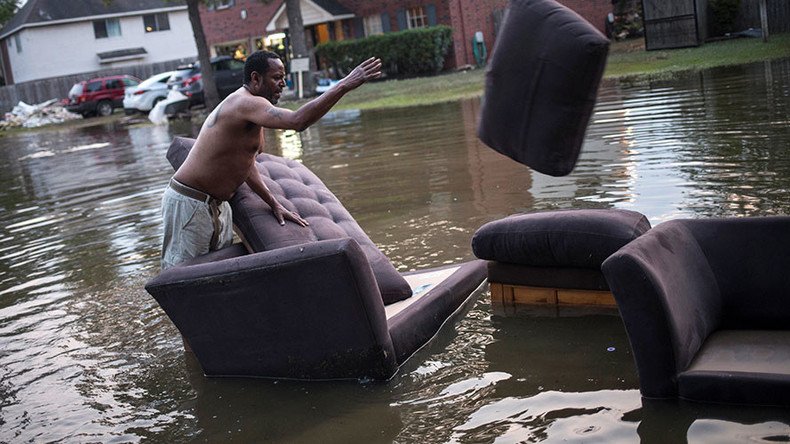Congress approves $15.25bn natural disaster aid package & raises US debt ceiling

The US Senate has approved a $15.25 billion relief package for areas affected by hurricanes and has tied it to measures that would raise the US government’s borrowing limit through December, following President Donald Trump’s deal with Democrats.
The package, passed 80-17, would provide initial aid to those affected by Hurricane Harvey, which flooded southern Texas last week, and also provide relief to areas in the US that are expected to be hit by Category 5 Hurricane Irma this weekend, primarily Florida.
To get it passed, President Trump struck a deal with Democratic Congressional leaders that would see the package tied to suspending the country’s debt ceiling and funding government operations through the end of the year.
Republican Congressional leaders, Senate Majority Leader Mitch McConnell and House Speaker Paul Ryan, wanted to push the debt ceiling deadline further into the future, but Trump agreed to the Democrats’ offer of a three-month extension.
Despite his opposition to the borrowing terms, Senator McConnell (R-Kentucky) supported the hurricane relief package on Thursday.
Senator Ted Cruz (R-Texas) called it “unfortunate” that the bill is tied to an increase in the debt ceiling. But he voted in favor of the package, saying it provide much-needed help to millions affected by Harvey in Texas.
“These funds are immediate, properly targeted to the areas hit by the storm, and focused on clean-up and rebuilding,” Cruz said in a statement. “This will not be nearly enough to cover all the costs – most estimates of total damage are well in excess of $100 billion – but it is a significant first step.”
The bill has yet to go back to the House of Representatives for approval, and then it goes to President Donald Trump’s desk to be signed.
On Wednesday, the House passed a $7.9 billion aid package for victims of Harvey with a vote of 419-3. The Senate added to that amount, to include other natural disasters this year, and also added the debt ceiling provision.
This week, the Federal Emergency Management Agency (FEMA) said it was running out of money, Bloomberg reported.
Here are the 17 Republican senators who voted against the Harvey aid+debt ceiling+government funding package https://t.co/5dYST5jCNkpic.twitter.com/Q8Xu78jlOx
— Bob Bryan (@RobertBryan4) September 7, 2017
Of the $1.01 billion in FEMA’s disaster relief fund, only $541 million was “immediately available” for assisting those affected by Harvey, a FEMA spokeswoman told the outlet on condition of anonymity. Another $472 million in the fund is being put towards preparation for Hurricane Irma, as well as the widespread wildfires currently raging in California.
In August, Trump complained that Democrats were “holding up” the increase of America’s borrowing limit, and suggested that Republicans attack it to a popular bill related to veterans, but they refused.
"Could have been so easy – now a mess!" - Trump https://t.co/VsgQj391nd
— RT America (@RT_America) August 24, 2017
“They didn’t do it, so now we have a big deal with [Democrats] holding them up (as usual) on Debt Ceiling approval. Could have been so easy – now a mess!” the president said on August 24.
Without raising the debt ceiling, the US government would run out of money by the end of September.
Congress suspended the debt ceiling on November 2, 2015, but the suspension expired on March 15, 2017. This meant the statutory debt limit could not go one penny higher than the $19.8 trillion it was on that day.












